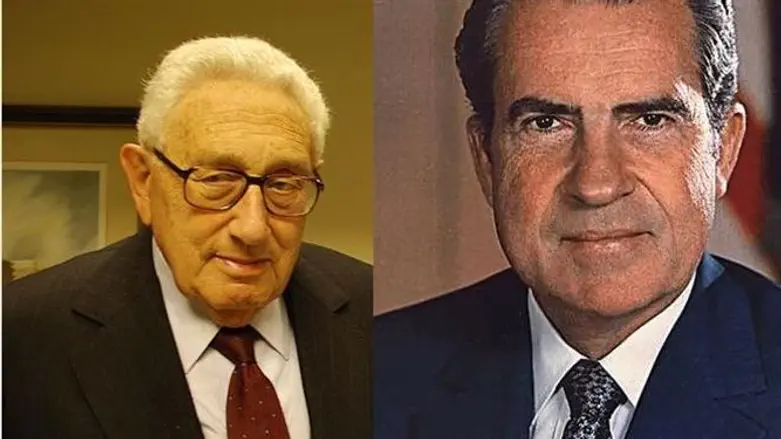
What would motivate a U.S. secretary of state who himself was a refugee from the Nazis, to constantly pressure Israel?
The question is relevant because Kissinger, a popular speaker, is featured at current Jewish events without connecting him to his past and to his behaviour towards Israel.
An important insight can be found in the pages of “The Prime Ministers,” the bestselling book by the late Yehuda Avner, a distinguished senior Israeli diplomat and top advisor to no less than five different Israeli prime ministers. Avner's book was a finalist for the 2010 National Jewish Book Awards and the Academy Award winning documentary film team at the Simon Wiesenthal Center produced a miniseries based on it.
Avner describes a revealing episode that took place in 1974, during one of Kissinger’s “shuttle diplomacy” missions. The secretary of state was holding a press conference in a Jerusalem hotel. Avner happened to be meeting at the same time, in the lobby of the same hotel, with Dr. William Fort, a renowned psychiatrist and professor at Johns Hopkins University.
Fort had been Kissinger’s closest boyhood friend when they were growing up in Germany. Both of their families immigrated to the United States and settled in Manhattan’s Washington Heights neighborhood.
When Kissinger concluded the press conference and began walking toward to the hotel exit, Fort rose to greet his longtime friend. Avner recounts what happened:
“Singularly excited, Willie shouted with a beaming smile and an outstretched hand, ’Heinz—recognize me? Wilhelm Furthangler from Furth. Remember?’
“The secretary of state flushed, threw Willie a contemptuous look, and strode on…eye[ing] Willie as if he was diseased…”
Fort and Avner sat down. Kissinger, Fort noted, “habitually insisted he had no lasting memories of his childhood persecutions in Germany.” That, Fort said, was simply “nonsense.” The future secretary of state was, after all, not an infant when his family left German—he was 15 years old.
“Kissinger’s Jewishness was a source of neurosis,” Fort continued. “His rebellion [against his parents’ Orthodox Judaism] was absolute and his assimilation total.”
Dr. Fort confided to Avner:
“I’ve learned through the White House grapevine that whenever Nixon feels Kissinger is getting to big for his boots he is not averse to resorting to nasty anti-Semitic barbs to cut him down to size. He has even been known to call him ‘my Jew boy’ to his face. And he takes a perverse satisfaction in humiliating him and taunting him with anti-Semitic slurs about how the Jews put Israel’s interests ahead of America’s, and how cliquey they are, wielding far too much power because of their wealthy and too much influence because of their control of the media, things like that…
“He pretends to shrug it off, concealing his humiliation, but then, back in the privacy of his room, he invariably goes into a tantrum and takes it out on his subordinates.”
Avner asked, “So how does this impact on his role as a mediator between us and the Arabs?”
Fort replied: “People like him invariably over-compensate. They…lean over backward in favor of the other side to prove they are being even-handed…Tell Yitzhak Rabin he should be most wary in dealing with our secretary of state. Tell him that deep inside him is an insecure and paranoid Jew.”
At the time, Avner may have wondered whether Fort’s disturbing portrayal of the Nixon-Kissinger relationship was accurate. Today, of course, we know that Fort was being accurate. The Oval Office tapes released in 2010, and reported on in The New York Times and elsewhere, contain numerous scenes similar to what Fort described—including the infamous episode in which Nixon forced Kissinger to drop to his knees and pray with him, Christian-style, on the floor.